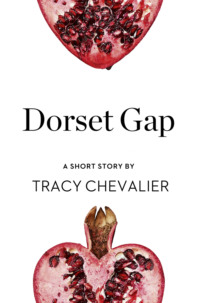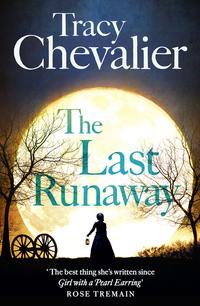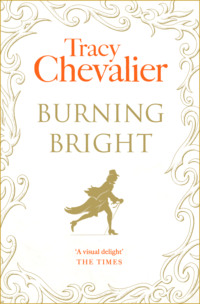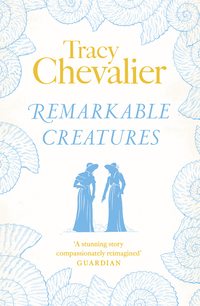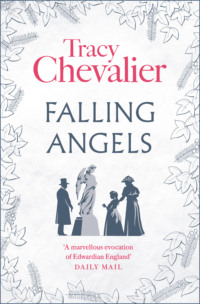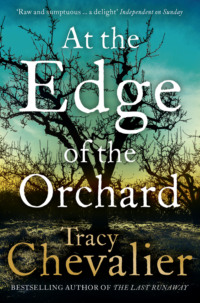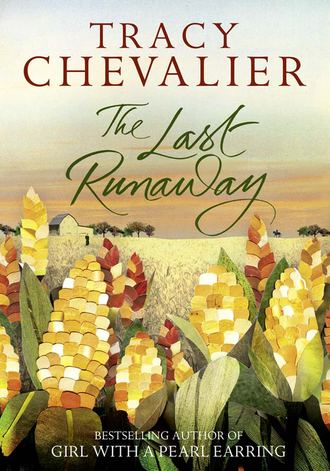
Полная версия
The Last Runaway
Belle had Honor work on bonnets again, finishing off some that customers were due to pick up that day. She edged one with lace, another with a double row of ruffles, then sewed clusters of cloth pansies to the inside rim of a stiff green bonnet and attached wide, pale green ribbons for tying under the chin. ‘Can you make more of them flowers if I give you the petals?’ Belle asked when Honor had finished.
Honor nodded: though she had never made flowers, since Quakers did not wear them, she knew they could not be harder than some of the intricate patchwork she had sewn for quilts.
Belle handed her a box full of petals and leaves. ‘I already cut out the petals after you went to bed last night. Just me and the whisky and the scissors. I like it that way.’ She showed Honor how to construct the pansies, then violets, roses, clover and little clusters of lace made to resemble baby’s breath. Honor wished Grace were there to see the things she was making: creations more and more colourful and elaborate.
Belle’s customers continued to comment on Honor’s presence, even those who had been to the shop the day before and already discussed her. ‘Goodness, look at that Quaker girl’s lap full of flowers!’ they cried. ‘Isn’t that the funniest thing! You’ll turn her, Belle, you will!’
Honor was only a short distraction, however, perhaps to be mulled over later. For now, once they’d made their remarks, the customers went on to the more important task of inspecting the latest goods and getting a bargain. Trying on the various hats and bonnets displayed on stands, they questioned Belle’s designs and criticised the shape and trim in order to drive down the price. Belle was equally determined to maintain her price, and a battle of words followed.
Honor was unnerved by the haggling, with its underlying assumption that the value of something could change depending on how badly someone wanted to buy or sell it. The lack of a fixed price made Belle’s hats take on a temporary quality. Quakers never haggled, but set what they felt was a fair price for materials and labour. Each product had what was thought of as its own intrinsic merit, be it a carrot or a horseshoe or a quilt, and that did not change simply because many people needed a horseshoe. Honor knew of merchants in Bridport who haggled, but they didn’t when she went into their shops or to their market stalls. The haggling she’d witnessed was off-hand, even embarrassed, as if the participants were only doing it in jest, because it was expected of them. Here the haggling seemed fiercer, as if both sides were adamant that they were right and the other not simply wrong, but morally suspect. Some of the women in Belle’s shop became so indignant as they argued with Belle that Honor wondered if they would ever return.
Belle, however, seemed entertained by the haggling, and unbothered when, more often than not, it reached a stalemate and the hat remained unsold. ‘They’ll be back,’ she said. ‘Where else can they go? I’m the only hat maker in town.’
Indeed, despite not managing to knock the price down, many women placed orders. Belle rarely measured their heads – most she knew already, and she could gauge a newcomer at a glance. ‘Twenty inches, most of ’em,’ she told Honor. ‘German heads a little bigger, but everybody else is pretty well the same, no matter how much or how little they got up there.’
Her choice of hat shapes and trim was often unusual, but most customers accepted her judgement, saving their arguments for the price rather than the style. From what Honor could see of the customers who came to pick up their hats, Belle usually was right, often choosing colours and styles for them that were different from what they normally wore. ‘Hats can go stale on you,’ she said to a woman she had just convinced to buy a hat dyed green and trimmed with straw folded and tucked to resemble heads of wheat. ‘You always want to surprise people with something new, so they see you different. A woman who always wears a blue bonnet with lace trim will start to look like that bonnet, even when she’s not wearing it. She needs some flowers near her eyes, or a red ribbon, or a brim that sets off her face.’ She inspected Honor’s plain cap so frankly that Honor ducked her head.
‘But you wear the same thing every day, Belle,’ the woman pointed out.
Belle patted her cap, which was almost as plain as Honor’s, though with a limp frill around the edge and a cord at the back that when pulled made a little pleat in the fabric. ‘It don’t do for me to wear anything fancy in the store,’ she said. ‘Don’t want to compete with my customers – you’re the ones got to look good. I wear my hats outside, for advertising.’
Despite the haggling, the frivolous trimmings, the feeling at times that she was an entertainment for the hat wearers of Wellington, Honor liked working for Belle. Whatever she was making, she was at least kept busy, with no time to think about the traumas of the past, the uncertainty she was living in, or of what lay ahead.
As she sat by the open window, Honor twice heard the thudding shoe of Donovan’s horse and saw him ride past. One afternoon he stationed himself at the hotel bar across the square, leaning against the railing, his eyes on the millinery shop and, it seemed, on her. She shrank back in her seat, but could not avoid his gaze, and soon moved to the back porch, away from his scrutiny.
Belle had given Honor another pile of bonnets to work on, but before she began she sat for a few minutes, listening. There were no sounds from the woodshed, but Honor could feel that someone was there. Now that she knew who, and could even name and describe him, she felt a little less frightened. After all, it was he who would be frightened of her.
Belle had been so matter-of-fact about slaves before, but the idea was still new and shocking to Honor. Bridport Friends had discussed the shame of American slavery, but it had merely been indignant words; no one had ever seen a slave in person. Honor was astonished that one was now hiding fifteen feet from her.
She picked up a grey bonnet almost plain enough for a Quaker to wear. The lining was a pale primrose yellow, and she was to sew mustard-coloured ribbons on to it, and add a yellow cord drawstring to the bavolet at the back of the neck where the cloth could be tightened and create a small ruff. Though at first Honor was doubtful of the colour combination, by the time she’d finished it, she had to acknowledge that the yellow lifted the grey, yet was pale enough not to make the bonnet gaudy, though the ribbon colour was more insistent than she would have chosen. Belle had unorthodox taste, but she knew how to use it to good effect.
During a lull in the shop, Belle brought out a tin mug of water. Leaning against the railing while Honor drank, she squinted into the yard. ‘There’s a snake sunning itself on the lumber,’ she announced. ‘Copperhead. You got copperheads in England? No? Keep away from ’em – you don’t want to get bit by one, it’ll kill you, and it ain’t a pretty death either.’ She disappeared inside, and came back out with a shotgun. Without warning, she aimed at the snake and fired. Honor started and squeezed her eyes shut, dropping the mug. When she dared to open them again, she saw the headless body of the snake lying in the grass, several feet from the planks. ‘There,’ Belle declared, satisfied. ‘Probably a nest, though. I’ll get some boys in there to kill ’em all. Don’t want snakes gettin’ into the woodshed.’
Honor thought about the man hiding there, almost three days now cramped in the heat and dark, and hearing the gunshot. She wondered how Belle came to be involved in hiding him. When her ears had stopped ringing, she said, ‘Thee mentioned that Kentucky is a slave state. Did thy family own slaves?’ It was the most direct question she had dared to ask.
Belle regarded her with yellowed eyes, leaning against the porch railing and still holding the shotgun, her dress hanging off her. It occurred to Honor that the milliner must have an underlying illness to make her so thin and discoloured. ‘Our family was too poor to own slaves. That’s why Donovan does what he does. Poor white people hate Negroes more’n anyone.’
‘Why?’
‘They think coloureds are takin’ work they should have, and drivin’ down the price of it. See, Negroes are valued a lot higher. Plantation owner’ll pay a thousand dollars for a coloured man, but a poor white man is worth nothin’.’
‘But thee does not hate them.’
Belle gave her a small smile. ‘No, honey, I don’t hate ’em.’
The bell on the shop door rang, announcing a customer. Belle picked up her gun. ‘Donovan’s gone, by the way. Saturday night he always drinks himself silly up at Wack’s in Oberlin – that’s one thing you can count on. Guess he’s startin’ early today. You can stop hiding from him back here if you want.’
Belle Mills’s Millinery
Main St.
Wellington, Ohio
6th Month 1st 1850
Dearest Biddy,
It grieves me to have to tell thee that God has taken Grace, six days ago, carried off by yellow fever. I will not go into details here – my parents can let thee read the letter I wrote them. How I wish thee were sitting here with me now, holding my hand and comforting me.
I think thee would be surprised to see where I am at this moment. I am sitting on the back porch of Belle Mills’s Millinery shop in Wellington, Ohio. The porch faces west, and I am watching the sun going down over a patch of land, at the end of which glints the metal track of a railroad. When finished, it will run south to Columbus and north to Cleveland. The Wellington residents are very excited about it, as we would be if the railway in England were to extend to Bridport.
Belle is one of the many strangers who has taken pity on me and helped me along the way. Indeed, Belle more than most has been kind. Her shop is only seven miles from Adam Cox, yet when I arrived, she did not pack me off to Faithwell as soon as she could. She sensed without asking that I needed a pause to gather myself after Grace’s death, and so has let me stay with her for a few days. In return I have been able to help with sewing, which has pleased me since it is a familiar activity, and I am able to feel useful rather than having to rely completely on others, or my purse, to look after me.
I am still stunned that Grace has been gone only a few days. Time and space have played funny tricks on me: the sea voyage seemed to go on for years, though it was but a month, and I already feel far from Hudson, where Grace is buried, though I have only been in Wellington three days. For someone whose life was so ordered and without surprise, a great deal has happened to me in a short time. I suspect America will continue to surprise me.
Already I am confused by its people, for they are so different from the English. Louder, for one thing, and they speak their minds in a way I am not accustomed to. Though they are familiar with Quakers, they think me odd. Customers in Belle’s shop have been forthright in saying so, and in an overly familiar manner that jars. Thee knows I am quiet; being around Americans has made me even quieter.
Yet they have their secrets. For example, I am almost certain that, barely fifteen feet from where I write this letter, a runaway slave is hiding. I also begin to suspect he was hidden somewhere in the wagon that brought me to Wellington. But I do not dare to find out, for men are searching for the slave, and thee knows I cannot lie if asked. At home it was easy enough to be truthful and open. I rarely had to conceal anything from my family or thee. Only the business with Samuel was difficult in that way. Now, however, I have to keep my thoughts close. I do not ever want to lie outright, but it is more challenging to keep to that principle here.
I can at least be honest with thee, my dearest friend. I confess that I am nervous about Adam Cox’s arrival tomorrow. He left for Ohio expecting only his future wife to join him, but now he has to contend with me without Grace. Of course I have known him and Matthew since the Coxes moved to Bridport, but they are older and not people I have been close to. Now they will be the only familiar faces amongst strangers.
Please say nothing of this to my parents, for I do not want them to worry about me. I do not think it is dishonest to withhold information about my feelings – they are not facts, and they are bound to change. Next time I write I hope to be able to report that I feel welcome in Faithwell and am content to live there. Until then, dear Biddy, keep me in thy thoughts and prayers.
Thy faithful friend,
Honor Bright
Silence

HONOR WOKE EARLY ON Sunday. Adam Cox would not come to pick her up until afternoon, after Meeting for Worship in Faithwell had finished, but anxiety made her lie awake in bed, listening to the dawn chorus of unfamiliar American birds, running her fingers over the outline of the Star of Bethlehem in the centre of the quilt, and waiting for the changes to come.
Despite staying up much of the night with a bottle, Belle was also up early. As they ate breakfast – more eggs and ham, along with hominy grits, a white, thin sort of porridge Belle said she’d grown up with in Kentucky – Honor wondered if the milliner would go to church. But Belle made no move to leave; after clearing up the kitchen she sat out on the back porch reading the Cleveland Plain Dealer, which a customer had left behind the day before. Honor hesitated, then got her Bible out of her trunk and went to join her.
The moment she sat down she knew the man was gone from the lean-to. There was a subtle shift in the atmosphere, and in Belle, who seemed more relaxed. She glanced over at the book in Honor’s lap. ‘I don’t go to church much myself,’ she remarked. ‘Me and the minister don’t agree on most things. But I’ll take you if you want. You got a choice of Congregationalist, Presbyterian or Methodist. I’d go for Congregationalist myself – better singers. I’ve heard ’em from outside.’
‘There is no need.’
Belle rocked in her chair while Honor opened her Bible, trying to remember what she had last read, with her sister on her deathbed, a lifetime ago. She read a passage here and there, but could not concentrate on the words.
Belle was rocking faster. ‘Somethin’ I want to know about Quakers,’ she announced, lowering the newspaper.
Honor looked up.
‘You sit in silence, don’t you? No hymns, no prayers, no preacher to make you think. Why’s that?’
‘We are listening.’
‘For what?’
‘For God.’
‘Can’t you hear God in a sermon or a hymn?’
Honor was reminded of standing outside St Mary’s Church in Bridport, just across the street from the Meeting House. The congregation had been singing, and she had been briefly envious of the sound.
‘It is less distracting in the silence,’ she said. ‘Sustained silence allows one truly to listen to what is deep inside. We call it waiting in expectation.’
‘Don’t you just think about what you’re having for dinner, or what someone said about someone else? I’d think about the next hat I’m gonna make.’
Honor smiled. ‘Sometimes I think about the quilt I am working on. It takes time to clear the mind of everyday thoughts. It helps to be with others also waiting, and to close one’s eyes.’ She tried to think of words to explain what she felt at Meeting. ‘When the mind is clear one turns inward and sinks into a deep stillness. There is peace there, and a strong sense of being held by what we call the Inner Spirit, or the Inner Light.’ She paused. ‘I have not yet felt that in America.’
‘You been to many Meetings in America?’
‘Only one. Grace and I went to a Meeting in Philadelphia. It was – not the same as England.’
‘Ain’t silence the same everywhere?’
‘There are different kinds of silence. Some are deeper and more productive than others. In Philadelphia I was distracted, and did not find the peace I was looking for that day.’
‘I thought Philadelphia Quakers are supposed to be the best there is. Top-quality Quakers.’
‘We do not think like that. But …’ Honor hesitated. She did not like to be critical of Friends in front of non-Quakers. But she had started, so she must continue. ‘Arch Street is a big Meeting, for there are many Friends in Philadelphia, and when Grace and I entered the room, there were not many benches still free. We sat on one that was, and were asked to move, for they said it was the Negro pew.’
‘What’s that?’
‘For black Members.’
Belle raised her eyebrows. ‘There’s coloured Quakers?’
‘Yes. I had not known there were. None came that day to Meeting, and the bench remained empty, even though the other benches grew crowded and uncomfortable.’
Belle said nothing, but waited.
‘I was surprised that Friends would separate black Members in that way.’
‘So that’s what kept you from God that day.’
‘Perhaps.’
Belle grunted. ‘Honor Bright, you are one delicate flower. You think just ’cause Quakers say everyone is equal in God’s eyes, that means they’ll be equal in each other’s?’
Honor bowed her head.
Belle shrugged and took up her newspaper again. ‘Anyway, I like me a good hymn. Give me that over silence any day.’ She began to hum, rocking in time to the simple, repetitive melody.
Later Belle had the neighbours’ boys bring down Honor’s trunk so that it was ready for Adam Cox’s arrival. After dinner they sat together in the shop to wait for him. Though the other shops were also closed, people strolled up and down, looking in the windows.
‘Thankee for your help,’ Belle said as they waited. ‘I’m caught up now. Won’t be so busy again till September when they bring me their winter bonnets to be retrimmed.’
‘I am very grateful to thee for having me.’
Belle waved her hand. ‘Honey, it’s nothing. Funny, normally I don’t take to company, but you’re all right. You don’t talk too much, for one thing. Are all Quakers as quiet as you?’
‘My sister was not quiet.’ Honor gripped her hands so they would not tremble.
‘Anyway,’ Belle said after a pause, ‘you can come here any time. Next visit I’ll show you how to make hats. Now, I got somethin’ for you.’ Belle went behind the counter and took down from a shelf the grey and yellow bonnet Honor had worked on the day before. ‘A new life needs a new bonnet. And this bonnet needs an adventure.’ When Honor did not take it, Belle pushed it into her hands. ‘It’s the least I can do, as pay for all that work you did. And it’ll suit you. Go on and try it.’
Honor reluctantly took off her old bonnet. Though she liked the dove grey of the body of the bonnet, she didn’t think the yellow rim would suit her. Yet when she looked in the mirror on the wall of the shop, she was startled to discover Belle was right. The yellow brim was like a soft halo that lit up her face.
‘There you go,’ Belle remarked, satisfied. ‘You’ll go to Faithwell lookin’ smart, and maybe just a little more up-to-date. And here’s a bit of the yellow left over – not enough for a lining so it’s not much use to me. I know you quilters like your scraps.’

Though she accepted that it was a silly thought, Honor wondered at first if Adam Cox was so cold with her because he didn’t like the new bonnet.
When they heard a wagon approach from the north, Honor and Belle went out to the front of the shop to meet him, Honor’s stomach twisting. Though she dreaded having to go through the details of Grace’s death with him, to witness his grief and reignite her own, she was also looking forward to seeing a familiar face. When he drew up in front of the shop, slow and careful, she stepped forward eagerly, and was stopped short by his stiff gaze, as if he were far away and not engaged in what he was looking at. He could not seem to meet her eye.Nonetheless she said, ‘Adam, I am glad to see thee.’
Adam Cox climbed down from the wagon. Honor had always been surprised that Grace chose to marry him. A tall man with the sloped shoulders of a shopkeeper, whiskers along his jaw, sober clothes and a broad-brimmed hat, he nodded at her as he approached the porch, but did not embrace her as a family member would. He looked uncomfortable, and it was confirmed to Honor even before he’d said a word that this would be a difficult reunion. There was no tie of blood or love to bind them, only circumstances and the memory of Grace. She felt tears welling, and struggled to keep them under control.
‘I am glad to see thee too, Honor,’ Adam said. He did not sound glad.
‘I thank thee for coming for me.’ Honor’s voice emerged strangled.
Belle had been watching them, crossing her arms over her chest as she made up her mind about Adam Cox. But she was civil. ‘I’m real sorry about your intended’s death, sir,’ she said. ‘God gives us a hard life, that’s for sure. You look after Honor, now. She’s had one hell of a time.’
Adam stared at her.
‘She’s also got the finest sewing hand in town,’ Belle added. ‘I got a lot of work out of her. Well, now, Honor, I guess I won’t see much of you – Faithwell’s closer to Oberlin than to here, so you’ll be goin’ that way for your provisions. You watch out for them Oberlinites – they got opinions about everything and they’ll be glad to tell you of ’em. You ever get tired of it over that way, come back – there’s always work for you here. There, now, what’s this?’ For Honor was crying. Belle put her arms around her and gave her a hard, bony hug. For a thin woman she was very strong.

The road north from Wellington was wider and more established than the route Honor and Thomas had taken from Hudson. The trees had been cut further back so that the forest was less oppressive, and there were farms and fields of corn and oats along the way, as well as pastures where cows grazed. There was little traffic, though, it being Sunday.
Within a mile, Honor understood a little better Adam Cox’s awkwardness: in terse words he told her that his brother Matthew had died three weeks before, of the consumption that brought Adam to Ohio to help with the business.
‘I am so sorry,’ Honor said.
‘It was expected. I did not want to burden Grace with the prognosis in my letters.’
‘How fares Matthew’s widow?’
‘Abigail is resigned to God’s will. She is of strong character and will cope. But tell me of Grace.’
Honor gave a brief account of her sister’s illness and death. Then they lapsed into silence, and she could feel in its density the weight of unasked questions and unspoken comments. Chief among them, she was sure, was: ‘What is the sister to me now that the wife is gone?’ Adam Cox was of course an honest and honourable man, and would accept responsibility for his would-be sister-in-law. But it was not easy for either.
Adam glanced over at Honor. ‘Is that bonnet new?’
Startled that he would show any interest in her wardrobe, Honor stuttered, ‘It – it was a gift, from Belle.’
‘I see. Thee did not make it.’
‘Is there something wrong with it?’
‘Not – wrong. It is different from what thee normally wears – what a Friend would wear. But no, not wrong.’ It was strange to hear his Dorset accent so far from home. Adam cleared his throat. ‘Abigail – Matthew’s widow – was not expecting thee. Indeed, I was not expecting thee either. We did not know thee was coming to Ohio until the milliner wrote the other day to say thee was with her.’


